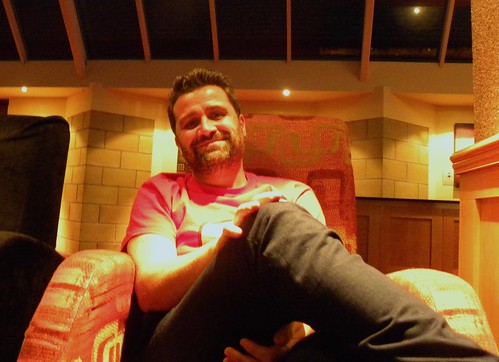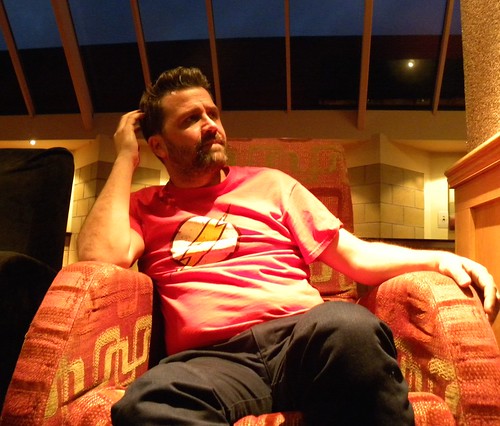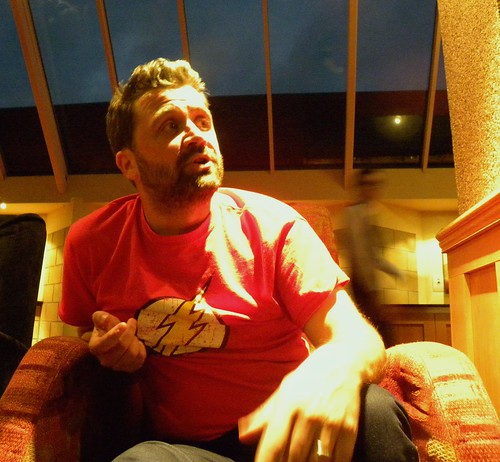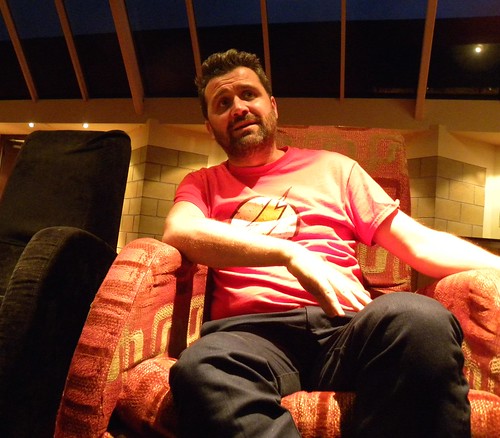Just as I am getting rather comfortable in my armchair in the Airth Castle Hotel lounge, I see someone who looks a little like my prey – Phil Earle – walking towards the bar. He seems like my likeliest option, so I heave myself up and go to stare ‘discreetly’ at him from afar. He nods at me, so I nod back, and decide I might as well go for this chap, whether or not he is Phil. (If not, he’s doing a remarkable job of pretending.)
His hair isn’t right. By that I mean, he doesn’t look like he did in photos online; not even the same hair I’d seen on his Facebook author page in photos taken earlier in the week. Other than that, his hair is just fine. Quiffier, somehow.
Anyway, this quiffy author gets up to rearrange the furniture in the bar, as my path from where I’m standing, to where he is, resembles an obstacle course of armchairs. Comfortable, but in the way. Phil shifts them in all sorts of directions, before we can finally shake hands.
He asks how my week has been, and it takes a while to extricate myself from the question, to ping it back at him. ‘I’ve had an amazing three days in Ayrshire,’ he says. And now he’s in Falkirk. ‘It’s a different atmosphere up here. In London, a lot of the schools are quite blasé about seeing authors. Here it’s a bit more far flung, a bit more appreciated. It’s been brilliant. We’ve sold a lot of books too.’ He points out that the selling is merely a nice side effect; ‘the amount of chat you get from the students afterwards has been fantastic.’
I ask which age group he’s been seeing, and it’s anything from S1 up. ‘We did a session with a special education school, which I haven’t done a lot of before. I loved it.’ He didn’t change anything for them, because ‘the kids often feel like they’re being talked down to. It was awesome.’
‘Yes, you’re a cool type, aren’t you?’
He laughs, ‘not me. I didn’t grow up wanting to be a writer. Sometimes that buys you a bit of currency with the kids. Especially the lads.’
‘You write for them, don’t you?’
‘I write for me, the stuff I’d read. I like Kevin Brooks, Keith Gray, Anthony McGowan.’
‘All boys’ books.’ We laugh. I mention Heroic, which I’ve just read a few sample chapters from, and which made for hard reading.
‘You end up getting typecast quite quickly.’
‘Your third book, The Bubble Wrap Boy felt serious while still being very light. There were mishaps, but it made me laugh. I remember I had my arm twisted to read Being Billy. The subject is not really me at all, but you treated it so differently.’
‘Good.’
‘But these chapters from Heroic…’
‘Yeah, scary right? I’m bloody proud of that book. I’ve always been terrified by the army, and I was trying to understand what it must be like. At the end of Heroic, they’re on top of a tower block, one bleeding, one carrying a gun. With The Bubble Wrap Boy I wanted to show people I could do lighter stuff, with something serious at its heart, you know. Nice to pull the rug under sometimes. I just identify with underdogs. In The Bubble Wrap Boy.., I have no idea where the friend came from. He kind of came out of nowhere.’
Phil talks so easily about his writing that I must ask, ‘are you doing well?’
‘Reviews wise, yeah. There’s a massive gulf between the John Greens and Veronica Roths, and Cassandra Clares, in terms of commercial success. They hit a nice spot, what readers want.’
‘They do.’
‘Look at the Meg Rosoffs, the David Almonds, Melvin Burgesses, Tony McGowan! Beautiful writers, critically they get the acclaim, but commercially they don’t sell what they should. They deserve to sell a hundred times more, but it’s really hard. It’s a real challenge for YA. Keith Gray is one of the reasons I write. If I’d been 15 and Keith had been writing then… I thought there were no books there for me. I was reading graphic books, comic books, but that was it. No aspirations to write, no aspirations to read. It didn’t float my boat at all.
I was lucky, I worked for Ottakar’s. It was utterly revolutionary for me, like a lightbulb moment. I read Holes, I read Skellig, I read Warehouse by Keith Gray and the Snicket books. Completely changed me.’
‘So you still have to work – do “proper” work – for a living?’
‘Three days a week. I’ve been really lucky, four books in, four years in. I was at Simon & Schuster, and I was using holidays to do school events. I love school events! I got a job at Bloomsbury, four days a week, and last summer I got an offer from David Fickling. I feel like the luckiest.., David is completely irresistible.’
‘I know.’
’It allows me to work three days a week, it allows me to focus on every single [David Fickling] book. My perk is giving authors the kind of treatment I’d like as an author; I know my books inside out, I know my authors really well, get to travel round the country as their sales and marketing director.’
‘You go round telling everyone what a wonderful book this is?’
‘That’s like the best gig in the world. It gives me a nice balance, and I commute from bed to the [bedroom] window. The challenge of that is that the four YA books were written on the bus to and from work, 500 words a day, 3,500 words a week. Now I’m doing some middle grade stuff, 35,000 words, it’s only ten weeks and I’m there. One of the funny things working with David is when you’re in the office, and Philip Pullman is sat in David’s office, you’re like a school kid…’
Here we continue the hero worshipping and sit and talk about John Green, Alan Gibbons, Bali Rai, and how much time they spend on travelling the world, to meet their fans. This Scottish tour is actually Phil’s first. He’s done individual events in the past, but not toured.’
‘Do you find that people want to be like Billy or Daisy?’
‘No. Kids in care are often referred to as children without a voice, which is the most ironic thing I’ve ever heard, because they are some of the noisiest. Really loud. Jacqueline Wilson did a magnificent job with Tracy Beaker, and I want to write about stuff honestly, give kids an insight into a life that could have been theirs, had things been different. Ronnie, the Colonel in Billy; I hadn’t planned his trajectory, at all. I did work with a load of male carers, ex-military, and it makes sense when you think of it. For them a children’s home is perfect.
The children used to call us Uncle or Auntie, but it teaches them the wrong thing about what a family really is.’ Phil goes on to describe how a child might be calling someone Auntie, only for that carer to leave their job a few weeks later, and that must give the child the idea that family can get up and go at any time. So any positive effect people might expect from having someone you could call Auntie, will be counterbalanced by the fact that it is only a job.
‘The thing with Ronnie is a bit like a romance.’
‘Yeah yeah. It’s interesting you say that, because I think that true for Heroic as well. It’s a love story about two brothers.’ Phil says he’s not brave enough to write anything [traditionally] romantic.
I speculate about the PenguinRandom effect, and mention my recent Jacqueline Wilson event. ‘She’s brilliant, is Jacqueline. Amazing woman. I used to be her rep when I worked at Transworld. At signings she used to slow down after a few hours, not because she was tired, but because those kids were the ones who had waited the longest… She used to give them more time. That’s absolute class.
Working in publishing made it [writing a book] easy and difficult at the same time. I’m four books in now, and have another six to come, under contract.’
‘Ohh, that’s not bad!’
‘Yeah, I’m writing six for Orion, a couple of young readers, and four 8-12 books, as well, which start coming out next May. The ideas I’ve got are younger at the moment, so I’m going to give that a whirl.’
‘Good thing if there can be more young books for boys.’
‘I think 8-12 books are often woefully ignored. I love the Carnegie, but the books more recently are predominantly YA, aren’t they? I’m hoping Marcus Sedgwick wins this year. I thought She’s Not Invisible was fabulous.’
‘Yes, one of the best.’
We spend a few minutes talking awards and winners, and putting literary prizes and their judges to rights, and Phil returns to one of his favourites, Tony McGowan. ‘He’s a very versatile writer. He’s hilarious, he’s brilliant,’ Phil says, and we find we are both enthusiastic about his Brock. ‘He’s writing a sequel.’
’Is he?’
‘I’d love to be on it just once [the Carnegie shortlist].’
And I’m sure he will, one day.
Three elderly ladies, wearing identical dressing gowns amble past our table in the bar. I make a point of not meeting Phil’s eye, as I’m not sure I could not giggle, just a little.
From there we move on to how old Bookwitch is (the cheek of it!), how many proofs I get, and how great it is for me to get out to met authors. Like Phil. And Anthony McGowan. And for once I can actually remember what the last book I read and loved was, because it was Michelle Magorian’s latest, Impossible!.
‘We just finished reading Goodnight Mister Tom with our eldest, and honestly I’d never read it before. I thought it was terrific.’
‘How old is he?’
‘He’s nine.’
I mention my surprise that Phil has four books out already. Time flies.
‘Working in publishing makes you cynical about sequels [he’s talking about Daisy], it was quite nice because it was set six to nine months before Billy. You could read it on its own.’
‘Was it harder to write about a girl?’
’In a way. I’d worked with girls who self-harm. With my middle class suburban upbringing, I had no concept that this even went on, you know. So when I was confronted by it from a carer point of view, I found it really difficult to get my head round. A lot of the stuff that happened to Daisy is what happened to me. The reason I stopped working with children is I had a nervous breakdown, when I was 26. I just couldn’t cope long term with what those children… It’s the book I get the most emails about, especially from young women. Some people have said it has helped, and then it doesn’t matter whether it sells or not.’
‘You need to find yourself in a book.’
‘That’s why I didn’t read as a kid, because the teacher was asking me to read Great Expectations, and The Grapes of Wrath, and poems, and they didn’t say anything to me. I used to read graphic novels. They were what taught me to read. Books like Maus, something that had real power.’
Our conversation is coming to an end, and when I ask what is he doing this evening, it seems he’s going to the cinema. And I’ve heard there’s some fancy dinner.
‘Another 300-400 students tomorrow, two schools. And then back home to the kids, to give my wife a rest. In theory, anyway. I’ve been Skyping them every night. It’s been quite fun. It’s really nice to be writing something they can read. They’re very good at turning the books face out in bookshops. I don’t do that myself, and I didn’t even train him! He did it instinctively; “they can’t see your book there, dad’.”’
He asks where my nearest bookshop is, and whether it’s any good. And poor Bookwitch that I am, I don’t actually know, but we assume that they are. Finally Phil wants to know what I’m reading right now, and I show him all three books I have in my bag; The Bubble Wrap Boy, which he signs, and two others, which he doesn’t. Maybe it’s his past as a rep or his present job as director of sales and marketing which means he knows a lot about current books and trends. He asks just the right questions about the books I brought. And about their authors.
And with that Phil gathers up his PR ladies and off they go to the movies. I move to make myself comfortable with my books and my water, but ‘unfortunately’ at that moment my driver turns up, and off we go too. Oh well.





Pingback: Earle at the Castle | Bookwitch